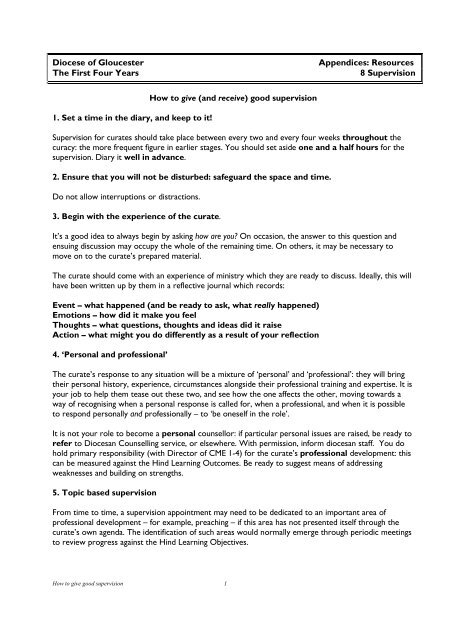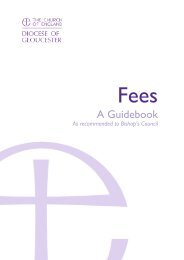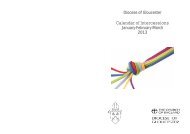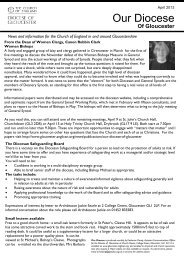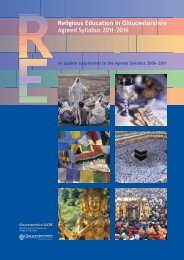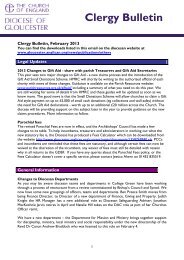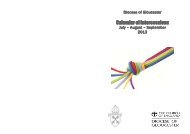How to give good supervision - Diocese of Gloucester
How to give good supervision - Diocese of Gloucester
How to give good supervision - Diocese of Gloucester
Create successful ePaper yourself
Turn your PDF publications into a flip-book with our unique Google optimized e-Paper software.
<strong>Diocese</strong> <strong>of</strong> <strong>Gloucester</strong><br />
The First Four Years<br />
Appendices: Resources<br />
8 Supervision<br />
1. Set a time in the diary, and keep <strong>to</strong> it!<br />
<strong>How</strong> <strong>to</strong> <strong>give</strong> (and receive) <strong>good</strong> <strong>supervision</strong><br />
Supervision for curates should take place between every two and every four weeks throughout the<br />
curacy: the more frequent figure in earlier stages. You should set aside one and a half hours for the<br />
<strong>supervision</strong>. Diary it well in advance.<br />
2. Ensure that you will not be disturbed: safeguard the space and time.<br />
Do not allow interruptions or distractions.<br />
3. Begin with the experience <strong>of</strong> the curate.<br />
It’s a <strong>good</strong> idea <strong>to</strong> always begin by asking how are you? On occasion, the answer <strong>to</strong> this question and<br />
ensuing discussion may occupy the whole <strong>of</strong> the remaining time. On others, it may be necessary <strong>to</strong><br />
move on <strong>to</strong> the curate’s prepared material.<br />
The curate should come with an experience <strong>of</strong> ministry which they are ready <strong>to</strong> discuss. Ideally, this will<br />
have been written up by them in a reflective journal which records:<br />
Event – what happened (and be ready <strong>to</strong> ask, what really happened)<br />
Emotions – how did it make you feel<br />
Thoughts – what questions, thoughts and ideas did it raise<br />
Action – what might you do differently as a result <strong>of</strong> your reflection<br />
4. ‘Personal and pr<strong>of</strong>essional’<br />
The curate’s response <strong>to</strong> any situation will be a mixture <strong>of</strong> ‘personal’ and ‘pr<strong>of</strong>essional’: they will bring<br />
their personal his<strong>to</strong>ry, experience, circumstances alongside their pr<strong>of</strong>essional training and expertise. It is<br />
your job <strong>to</strong> help them tease out these two, and see how the one affects the other, moving <strong>to</strong>wards a<br />
way <strong>of</strong> recognising when a personal response is called for, when a pr<strong>of</strong>essional, and when it is possible<br />
<strong>to</strong> respond personally and pr<strong>of</strong>essionally – <strong>to</strong> ‘be oneself in the role’.<br />
It is not your role <strong>to</strong> become a personal counsellor: if particular personal issues are raised, be ready <strong>to</strong><br />
refer <strong>to</strong> Diocesan Counselling service, or elsewhere. With permission, inform diocesan staff. You do<br />
hold primary responsibility (with Direc<strong>to</strong>r <strong>of</strong> CME 1-4) for the curate’s pr<strong>of</strong>essional development: this<br />
can be measured against the Hind Learning Outcomes. Be ready <strong>to</strong> suggest means <strong>of</strong> addressing<br />
weaknesses and building on strengths.<br />
5. Topic based <strong>supervision</strong><br />
From time <strong>to</strong> time, a <strong>supervision</strong> appointment may need <strong>to</strong> be dedicated <strong>to</strong> an important area <strong>of</strong><br />
pr<strong>of</strong>essional development – for example, preaching – if this area has not presented itself through the<br />
curate’s own agenda. The identification <strong>of</strong> such areas would normally emerge through periodic meetings<br />
<strong>to</strong> review progress against the Hind Learning Objectives.<br />
<strong>How</strong> <strong>to</strong> <strong>give</strong> <strong>good</strong> <strong>supervision</strong> 1
<strong>Diocese</strong> <strong>of</strong> <strong>Gloucester</strong><br />
The First Four Years<br />
Appendices: Resources<br />
8 Supervision<br />
6. Process <strong>of</strong> <strong>supervision</strong><br />
Supervision can include: giving information (i.e. clarification) ; <strong>of</strong>fering <strong>of</strong> support and encouragement;<br />
being challenging; being cathartic; giving both positive and negative feedback. It is important <strong>to</strong> avoid<br />
collusion, either in ignoring a particular area, or issue. Modelling honesty and openness, and inviting<br />
honest feedback and questions about one’s own practice <strong>of</strong> ministry can help this.<br />
7. Outcomes <strong>of</strong> <strong>supervision</strong><br />
Supervision is intended <strong>to</strong> be transformative. An indication <strong>of</strong> this is that an agreed note should be<br />
made at the end <strong>of</strong> the <strong>supervision</strong> <strong>of</strong> the subject and any learning goals achieved or identified as a result<br />
<strong>of</strong> the conversation.<br />
You should not ask <strong>to</strong> see the journal, but having it there it will root the discussion in reality. Examples<br />
<strong>of</strong> discussions are <strong>of</strong>fered in the Helping the Helpers handout. You should be ready <strong>to</strong> listen, probe,<br />
engage, and share your own experience honestly as a way <strong>of</strong> enabling the curate <strong>to</strong> learn and grow in<strong>to</strong><br />
their vocation.<br />
8. Boundaries<br />
Keeping <strong>good</strong> boundaries reaps real rewards in <strong>supervision</strong>: timekeeping, confidentiality and a personally<br />
informed pr<strong>of</strong>essionalism will provide a <strong>good</strong> foundation for a worthwhile partnership.<br />
9. Supervision for all<br />
To <strong>of</strong>fer <strong>good</strong> <strong>supervision</strong>, a person needs <strong>to</strong> be receiving <strong>supervision</strong> themselves. (Advice on this may<br />
be taken from the Direc<strong>to</strong>r <strong>of</strong> Curate Training.)<br />
10. Prayer<br />
Remember <strong>to</strong> pray for your curate – both when you are with them, and when you are alone.<br />
Additional Notes: how <strong>to</strong> receive <strong>good</strong> <strong>supervision</strong><br />
Curates need <strong>to</strong> take responsibility for their side <strong>of</strong> all <strong>of</strong> the above points. They need <strong>to</strong> ensure that<br />
diary time is set aside, and that they make adequate preparation for the <strong>supervision</strong>. They must be ready<br />
<strong>to</strong> talk about themselves – and <strong>to</strong> expect their incumbent <strong>to</strong> be ready <strong>to</strong> be disclosive (but not subject<br />
<strong>to</strong> <strong>supervision</strong>: responsibility in the relationship is not equivalently two-way). Supervision is at the heart<br />
<strong>of</strong> formation in ministry: it is the responsibility <strong>of</strong> all members <strong>of</strong> the training partnership <strong>to</strong> ensure that<br />
it happens.<br />
John Witcombe July 2009<br />
<strong>How</strong> <strong>to</strong> <strong>give</strong> <strong>good</strong> <strong>supervision</strong> 2


